聚焦中考同义句转换十二类型
- 格式:doc
- 大小:228.00 KB
- 文档页数:35
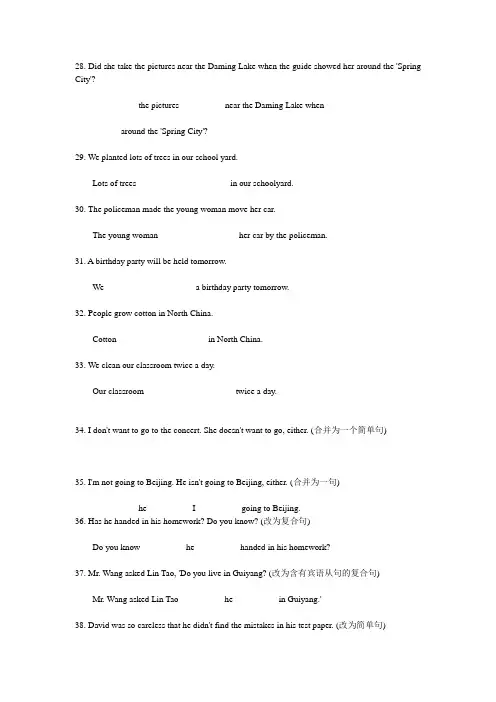
28. Did she take the pictures near the Daming Lake when the guide showed her around the 'Spring City'?__________ the pictures__________ near the Daming Lake when__________ ____________________ around the 'Spring City'?29. We planted lots of trees in our school yard.Lots of trees __________ __________ in our schoolyard.30. The policeman made the young woman move her car.The young woman____ ___ ___ _____ her car by the policeman.31. A birthday party will be held tomorrow.We__________ __________ a birthday party tomorrow.32. People grow cotton in North China.Cotton__________ __________ in North China.33. We clean our classroom twice a day.Our classroom__________ __________ twice a day.34. I don't want to go to the concert. She doesn't want to go, either. (合并为一个简单句)______________________________________35. I'm not going to Beijing. He isn't going to Beijing, either. (合并为一句)__________ he__________ I__________ going to Beijing.36. Has he handed in his homework? Do you know? (改为复合句)Do you know__________ he__________ handed in his homework?37. Mr. Wang asked Lin Tao, 'Do you live in Guiyang? (改为含有宾语从句的复合句)Mr. Wang asked Lin Tao__________ he__________ in Guiyang.'38. David was so careless that he didn't find the mistakes in his test paper. (改为简单句)David was___careless____find the mistakes in his test paper.39. Did you do your homework last night? (作否定回答)__________ , I__________ .40. Will they have a sports meeting? Do you know? (合并为一句)Do you know__________ they__________ have a sports meeting?41. I'm reading a book. The book is about Bill Gates. (河南)(合并为一个含有定语从句的复合句)________________________________________参考答案:28. Were, taken, she was shown29. were planted30. was made to move31. will / shall have32. is grown33. is cleaned七、其它34. Neither she nor I want to go to the concert.35. Neither, nor, am36. if / whether, has37. if / whether, lived38. too, to39. No, didn't40. if / whether, will41. I am reading a book which /that is about Bill Gates.Or The book I'm reading is about Bill Gates.。
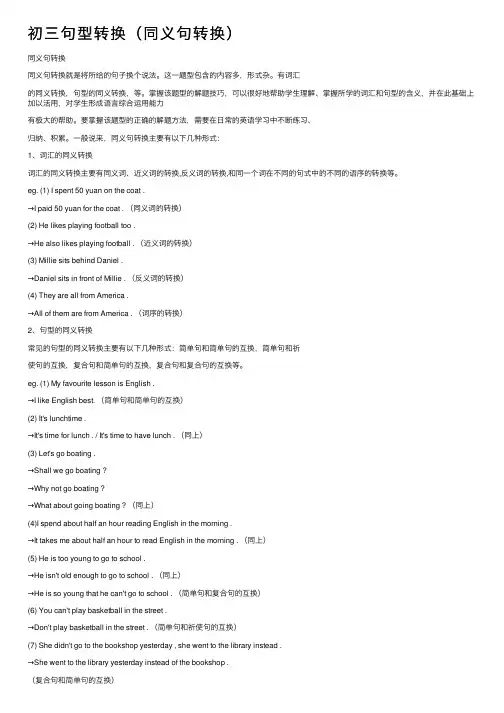
初三句型转换(同义句转换)同义句转换同义句转换就是将所给的句⼦换个说法。
这⼀题型包含的内容多,形式杂。
有词汇的同义转换,句型的同义转换,等。
掌握该题型的解题技巧,可以很好地帮助学⽣理解、掌握所学的词汇和句型的含义,并在此基础上加以活⽤,对学⽣形成语⾔综合运⽤能⼒有极⼤的帮助。
要掌握该题型的正确的解题⽅法,需要在⽇常的英语学习中不断练习、归纳、积累。
⼀般说来,同义句转换主要有以下⼏种形式:1、词汇的同义转换词汇的同义转换主要有同义词、近义词的转换,反义词的转换,和同⼀个词在不同的句式中的不同的语序的转换等。
eg. (1) I spent 50 yuan on the coat .→I paid 50 yuan for the coat . (同义词的转换)(2) He likes playing football too .→He also likes playing football . (近义词的转换)(3) Millie sits behind Daniel .→Daniel sits in front of Millie . (反义词的转换)(4) They are all from America .→All of them are from America . (词序的转换)2、句型的同义转换常见的句型的同义转换主要有以下⼏种形式:简单句和简单句的互换,简单句和祈使句的互换,复合句和简单句的互换,复合句和复合句的互换等。
eg. (1) My favourite lesson is English .→I like English best. (简单句和简单句的互换)(2) It's lunchtime .→It's time for lunch . / It's time to have lunch . (同上)(3) Let's go boating .→Shall we go boating ?→Why not go boating ?→What about going boating ? (同上)(4)I spend about half an hour reading English in the morning .→It takes me about half an hour to read English in the morning . (同上)(5) He is too young to go to school .→He isn't old enough to go to school . (同上)→He is so young that he can't go to school . (简单句和复合句的互换)(6) You can't play basketball in the street .→Don't play basketball in the street . (简单句和祈使句的互换)(7) She didn't go to the bookshop yesterday , she went to the library instead .→She went to the library yesterday instead of the bookshop .(复合句和简单句的互换)(8) I went to bed after my mother came back last night .→I didn't go to bed until my mother came back last night .(复合句和复合句的互换)保持句意不变⼀,简单句与复合句的转换(保持句意不变,合并成⼀句)1. Creating a comic strip is difficult.It’s difficult _______ _______ a comic strip.2. We learn new words with pictures. We can remember them easily.We learn new words with pictures_______ ________we can remember them easily.3. We buy a special program in order to help the computer recognize our voice.We buy a special program ________ ________ it can help the computer recognize our voice.4. Detective Ken spent a week dealing with the case.Detective Ken a week to deal with the case.5. A team of men spent a whole day moving the ancient building._________ _________ a team of men a whole day to move the ancient building.6. Sally spent about 625 dollars on the iphone4 last Friday.Sally ________ about 625 dollars _______ the iphone4 last Friday.7.Mr. Smith set out early for the airport so that he could catch his flight.Mr. Smith set out early for the airport _________ _________ to catch his flight.8. Detective Ken did a lot about the case in order to find out the truth.Detective Ken did a lot about the case ________ ________ he could find out the truth.9. We learn a language in order to communicate.We learn a language _________ _______ we can communicate.10. The hardworking man went home after he finished all the work that day.The hardworking man ________ go home ________ he finished all the work that day. ⼆,宾语从句的转换改为间接引语)1.. He asked: “ How can I get to the Bund?” (He asked___________ he __________ get to the Bund.合并为⼀句)2. Mrs. Lin asked me “Have you finished drawing the picture?” (Mrs. Lin asked me ________ I ________ finished drawing the picture.3. When will we take an English exam? We wanted to know. (改为宾语从句)We wanted to know we take an English exam.(改为宾语从句)4. “Can you help me repair the bike?” Mary asked Jack.Mary asked Jack _____________he _____________ help her repair the bike.5. “Do you always catch such an early train?” The policeman asked the man.(合并为⼀句)The policeman asked the man ________ he always ________ such an early train.6. Frank asked me, "Have you ever created a comic strip?" (改为宾语从句)Frank asked me whether ________ ________ ever created a comic strip.7. “Mum, was the telephone invented by Bell?” the girl asked. (改为宾语从句) The girl asked her mum ________ the telephone ________ invented by Bell.8. I wondered. Will Jack recognize me after such a long time? (合并两句)I wondered ________ Jack ________ recognize me after such a long time.9. When are we going to visit the museum? Do you know? (改为宾语从句)Do you know when _______ _______ going to visit the museum?the driver.(合并为⼀句)10. “Is it the last bus to the city centre?” I askedI asked the driver ________ it ________ the last bus to the city centre.the sales manager wanted to11. “Are there any new products for the European market?” know.The sales manager wanted to know _________ there ________ any new products for the European market.12. Could you tell me? How can I deal with all these problems?Could you tell me how _______ _______ deal with all these problems13. “Does anyone need my help with the school project?” The class teacher asked.The class teacher asked ________ anyone ________ his help with the school project.三,条件状语从句内部以及与祈使句的转换1. Be quick, or you can’t catch the bus.you quick, you can’t catch the bus.2. We will have a barbecue in th e forest park if it doesn’t rain this Sunday.We will have a barbecue in the forest park __________ it __________ this Sunday.3. I prefer to sleep with the window wide open unless it’s really cold.I prefer to sleep with the window wide open ________ it ________ really cold.四,其他1. The water is warm. The baby can take a bath in it. (两句合并为⼀句简单句)The water is ____________ ____________ for the baby to take a bath in.2. Our monitor is too weak to play football any more. (保持原句意思)Our monitor is not ________ ________ to play football any more.保持句意基本不变)3. The box on the shelf is so heavy that the boy can’t carry it. (The box on the shelf isn’t _____________ _____________ for the boy to carry.4. The Korean pop music video Gangnam Style is very popular. Many people would like tolearn the funny dance.The Korean pop music video Gangnam Style is ________ popular ________ many peoplewould like to learn the funny dance.5. This shelf is too small to hold all your books.(保持句意基本不变)This shelf is small it can’t hold all your books.6. I was so lucky that I was in the right place at the right time. (保持句意基本不变)I was ________ _______ to be in the right place at the right time.sked me another question.7 The teacher didn’t answer my question. He aThe teacher asked me another question ________ of ________ my question.8. Lucy has been to Beijing. Mark has been to Beijing as well.____________Lucy and Mark ____________been to Beijing.9. We can go to the museum by bus. We can go there by underground instead.We can go to the museum _________ by bus _________ by underground.10. We cannot drink sea water. We cannot take a shower with it, either. We can ________ drink sea water ________ take a shower with it.11. George didn’t do his homework. He watched TV news.George watched TV news ________ ________ doing his homework.12. Sam didn’t go with his classmates for the party. He went to see a film alone.Sam went to see a film alone _________ __________ going with his classmates for the party.13. I was the only person who was invited to the party.Nobody ___________ me ____________ invited to the party.14. Yesterday my friend Charlie said sorry to me because he broke my glasses.Yesterday my friend Charlie ________ to me ________ breaking my glasses.15. What would you like to ask besides this question?What would you like to ask _______ ________ to this question?16. The 30th Olympic Games were held in London in 2012.The 30th Olympic Games ________ ________ in London in 2012.17. Remember to say sorry to others if you do something wrong.Remember to ________ ________ others if you do something wrong.18. My daughter studies both singing and dancing in the kindergarten.My daughter studies singing ________ ________ as dancing in the kindergarten.19. Amy looks after the pets when her parents are away from home.Amy the pets when her parents are away from home.20. We cannot predict the exact time and location of earthquake now.________ ________, we cannot predict the exact time and location of earthquake. .21.To do this job well, you need time, and you also need brains.To do this job well, you need time and brains _________ __________.22. Sitting up too late at night is harmful to our health.Sitting up too late at night is ________ ________ our health.23. Why didn’t you tell him the truth when he asked you about his illness?________ ________ tell him the truth when he asked you about his illness?。
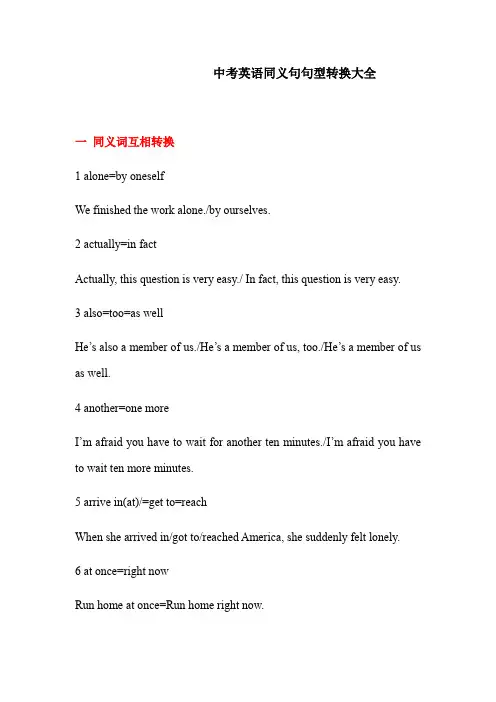
中考英语同义句句型转换大全一同义词互相转换1 alone=by oneselfWe finished the work alone./by ourselves.2 actually=in factActually, this question is very easy./ In fact, this question is very easy.3 also=too=as wellHe’s also a member of us./He’s a member of us, too./He’s a member of us as well.4 another=one moreI’m afraid you have to wait for another ten minutes./I’m afraid you have to wait ten more minutes.5 arrive in(at)/=get to=reachWhen she arrived in/got to/reached America, she suddenly felt lonely.6 at once=right nowRun home at once=Run home right now.7 continue/go onLet’s continue/go on reading the passage.8 cost=spend=take=pay(1)I spent ten yuan of/(in) buying this book../This book cost me tenyuan./I paid ten yuan for this book.(2)It took us three days to fulfill this task./We spent three days on thistask/in fulfilling this task.9 cross=go acrossBefore crossing/going across the road, please look both sides.10 sometimes/=t timesHe is a good man, but he can be really bad-tempered sometimes./at times.11 die/=ose one’s lifeThose people died/lost their lives during the earthquake.12 now/at the momentShe is talking about the problem with her classmates now./at the moment 13 else=otherWhat else/other things can you see in the picture?14 then=t that moment/at that timeShe was shopping then/at that moment/at that time, so she knew nothing about it.15 like/love/enjoy/be fond of/be interested in/care forShe likes/enjoys/loves/is fond of/is interested in/cares for collecting stamps very much.16 will/be going to/be about toThe teachers will/are going to/are about to have a meeting tomorrow afternoon.17 want/would likeDo you want to go abroad to study further?/Would you like to go abroad to study further/18 can/be able to/have the ability to doCan you tell me the way to the library?/Are you able to tell me the way to the library?/Do you have the ability to tell me the way to the library?19 visit/call onLin Tao visited/called on his grandparents last week.20 favorite/like bestWhat’s your favorite sport?/What sport do you like best?21 happen/take placeWhat happened?/What took place?22 decide/make a decision/make up one’s mindShe can’t decide/make a decision/make up her mind where to go.23 found/establish/set upThe students founded/established/set up a group to protect the environment.24 finally/at last/in the endFinally/At last/In the end, she won the race.25 leave/be awayHe left yesterday./He has been away for a day.26 return/give backHe hasn’t returned the book to me./He hasn’t given the book back to me. return/go backHe will go back/return in a month.27 why/what for/how come-She cried so badly. –How come?What did she cry so sadly for?/Why did she cry so badly?28 over/more thanOver/More than a hundred people tried this new kind of food.29 whatever/no matter whatWhatever/No matter what you find in the box, they belong to Amy.30 whenever/no matter whenWhenever/No matter when you come to see me, I will treat you as my relative.31 walk/ go…on footDo you walk to school every day?/Do you go to school on foot every day?32 should/ought to/be supposed toWe should/ought to/are supposed to use both sides of the paper to reduce wastes.33 population/peopleWhat is the population of China?/How many people are there in China?34 quit/stop/drop/give upMy father quitted/stopped/dropped/gave up smoking.35 maybe/perhaps/may beMaybe/Perhaps it is not my pen./ The pen may not be mine.二同义词组互相转换1 a lot of/lots ofA lot of/Lots of artists will show their faces at the party.2 all over the world/around the worldEnglish is spoken widely all over the world./around the world3 not as(so)…as/less thanThis book is not as(so) interesting as that one./That book is more interesting than this one.4 as…as possible/as…as sb canRun home as fast as possible/as fast as you can to tell your mother the good news.5 at risk/in danger/in troubleThe pandas in our country are at risk./in trouble/in danger6 at the age of…/when sb.+be+…years oldHis parents died when he was six years old./His parents died at the age of six.7 because of/due to/as a result of/with one’s help/thanks toBecause of?/Due to/As a result of his help, he passed this exam.With his help/With the help of him, he passed the exam./Thanks to his help, he passed the exam.8 be careful/look out/take careLook out!/Be careful/Take care! The flood is coming.9 be worried about/worry aboutLiu Ming is worried about his following oral test./Liu Ming can’t stop his following oral test.10 both…and…/not only…but also…He is not only a singer but also a doctor./He is both a singer and a doctor.11 be good at/do well inHe is good at drawing./He does well in drawing.12 be proud of/take pride inWe are all proud of our country’s astronaut./He takes pride in ourcountry’s astronaut.13 come up with/think of/have an ideaTome came up an idea./Tom thought of an idea./Tom had an idea.14 ride a bike/go…by bikeHe often rides a bike to work./He often goes to work by bike.15 come from/be fromWhere do you come from?/Where are you from?16 have a good time/enjoy oneself//play happilyWe had a good time/enjoyed ourselves/played happily on Christmas Day.17 have a pain in head/have a headacheHe didn’t go to school today, because he had a pain in head./had a headache18 hear from/receive(get) a letter fromShe is very happy to hear from/receive a letter from a Canadian friend. 19 had better do/It’s best to doYou had better read in the sun./It’s best for you to read in the sun.20 how about/what aboutHow about/What about going skating?21 in order to/in order that/to do/so thatHe worked day and night to be a successful man./He worked day and night in order to be a successful man./He worked day and night in order that he could be a successful man./He worked day and night so that he could be a successful man.22 keep off/keep away fromKeep off /Keep away from the grass!23 in/wearShe is in/wears a white dress today.24 keep sb. from doing/stop sb. (from) doing/prevent sb. (from) doing Trees can stop the soil flowing away./ Trees can prevent the soil flowing away./Trees can keep the soil from flowing away.25 learn …by oneself/ teach oneselfNobody taught him. He learnt it by himself./He taught himself.26 like …better than/prefer…to…/prefer to do…rather than do …John likes swimming better than skating./John prefers swimming to skating./John prefer to swim rather than skate.27 long, long ago/once upon a timeLong, long ago/Once upon a time, there was a beautiful princess living in an old castle.28 look after well/take good care ofThanks for looking after my cat /taking good care of my cat well while I was away.29 no longer/not …any longerShe is no longer a little girl./She is not a little girl any longer.30 shall we/Let’s..Shall we watch the film together?/Let’s watch the film together.31 take part in/join in/participate inHe took part in /joined in/participated in the match.32 too…to/so…that…/enough to…He is too busy to visit us./He is so busy that he can’t visit us./He is not free enough to visit us.三同义句型互相转换1运用两种时态(一般过去时和现在完成时互相转换)(1)He left last year.(2)He has been away for one year.(3)He has been away since a year ago.(4)It is a year since he left.(5)One year has passed since he left.2最高级和比较级的互相转换(1)He is the tallest student in his class.(2)He is taller than any other student in his class.(3)He is taller than the other students in his class.(4)No one else is taller than him in his class.3运用两种语态(主动语态和被动语态互相转换)I clean my room every day./My room is cleaned every day. 4感叹句的两种句型之间互相转换What a careful girl she is!/How careful the girl is!5运用关联词语合并句子(1)Amy can’t dance. Susan can’t, either.Neither Amy nor Susan can dance.(2)I has eaten breakfast and my mother has eaten it, too.Both my mother and I have eaten breakfast.6运用复合句和不定式互相转换(1)I hope that I can visit the moon one day./I hope to visit the moon oneday.(2)He told me how he could use a computer./He told me how to use acomputer.7运用不同的句式结构互相转换(1)She wants to go shopping and her friends want to go shopping,too./She wants to go shopping, and so do her friends.(2)He went to bed after he finished his homework./He went to bed afterfinishing his homework./He didn’t go to bed until he finished his homework.(3)Come on, or we’ll miss the early bus./If we don’t hurry, we’ll miss theearly bus.(4)The man gave us a talk last week, and he will give us another talk thisweek./The man who gave us a talk last week will give us another talk this week.8用it做形式主语互相转换(1)He can finish the work easily./It is easy for him to finish the work.(2)We found it hard to shake./We found it was hard to skate.。
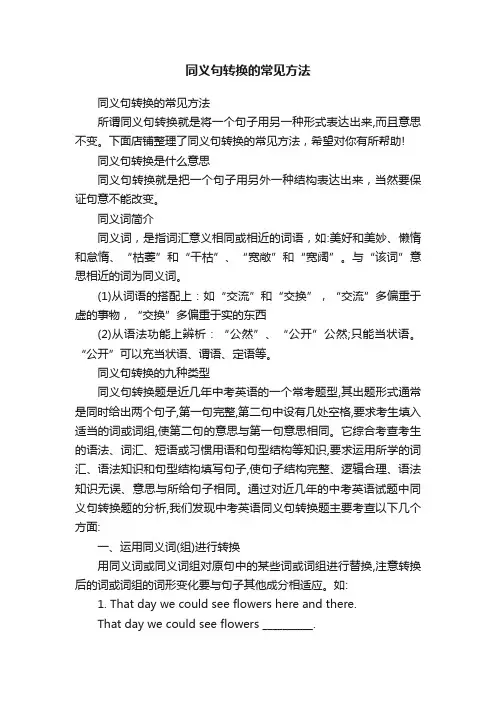
同义句转换的常见方法同义句转换的常见方法所谓同义句转换就是将一个句子用另一种形式表达出来,而且意思不变。
下面店铺整理了同义句转换的常见方法,希望对你有所帮助!同义句转换是什么意思同义句转换就是把一个句子用另外一种结构表达出来,当然要保证句意不能改变。
同义词简介同义词,是指词汇意义相同或相近的词语,如:美好和美妙、懒惰和怠惰、“枯萎”和“干枯”、“宽敞”和“宽阔”。
与“该词”意思相近的词为同义词。
(1)从词语的搭配上:如“交流”和“交换”,“交流”多偏重于虚的事物,“交换”多偏重于实的东西(2)从语法功能上辨析:“公然”、“公开”公然;只能当状语。
“公开”可以充当状语、谓语、定语等。
同义句转换的九种类型同义句转换题是近几年中考英语的一个常考题型,其出题形式通常是同时给出两个句子,第一句完整,第二句中设有几处空格,要求考生填入适当的词或词组,使第二句的意思与第一句意思相同。
它综合考查考生的语法、词汇、短语或习惯用语和句型结构等知识,要求运用所学的词汇、语法知识和句型结构填写句子,使句子结构完整、逻辑合理、语法知识无误、意思与所给句子相同。
通过对近几年的中考英语试题中同义句转换题的分析,我们发现中考英语同义句转换题主要考查以下几个方面:一、运用同义词(组)进行转换用同义词或同义词组对原句中的某些词或词组进行替换,注意转换后的词或词组的词形变化要与句子其他成分相适应。
如:1. That day we could see flowers here and there.That day we could see flowers __________.分析:答案为everywhere。
everywhere与here and there都表示“到处”。
2. The teacher always takes good care of the children in the school.The teacher always_______ ______the children well in the school.分析:答案为looks after。
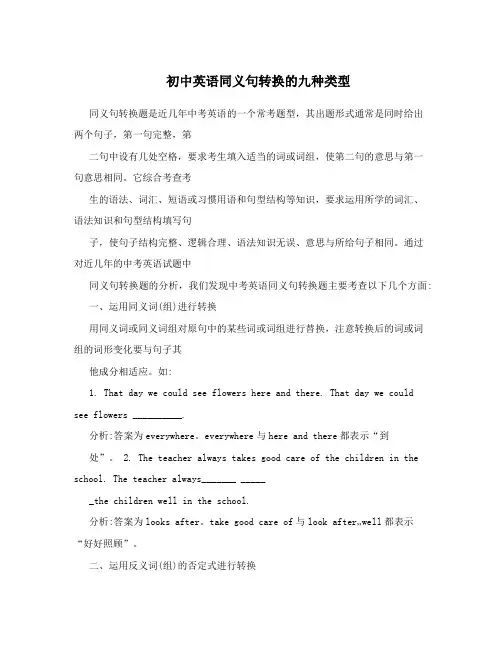
初中英语同义句转换的九种类型同义句转换题是近几年中考英语的一个常考题型,其出题形式通常是同时给出两个句子,第一句完整,第二句中设有几处空格,要求考生填入适当的词或词组,使第二句的意思与第一句意思相同。
它综合考查考生的语法、词汇、短语或习惯用语和句型结构等知识,要求运用所学的词汇、语法知识和句型结构填写句子,使句子结构完整、逻辑合理、语法知识无误、意思与所给句子相同。
通过对近几年的中考英语试题中同义句转换题的分析,我们发现中考英语同义句转换题主要考查以下几个方面:一、运用同义词(组)进行转换用同义词或同义词组对原句中的某些词或词组进行替换,注意转换后的词或词组的词形变化要与句子其他成分相适应。
如:1. That day we could see flowers here and there. That day we couldsee flowers __________.分析:答案为everywhere。
everywhere与here and there都表示“到处”。
2. The teacher always takes good care of the children in the school. The teacher always_______ ______the children well in the school.分析:答案为looks after。
take good care of与look after…well都表示“好好照顾”。
二、运用反义词(组)的否定式进行转换即用反义词或词组的否定式表达与原句相同的意思,主要考查学生对反义词(词组)的积累和换位思维的能力。
如: 1. It’s clear that this visit is differ ent from last time. It’s clear that this visit is not the___ ___last time.分析:答案为same as。
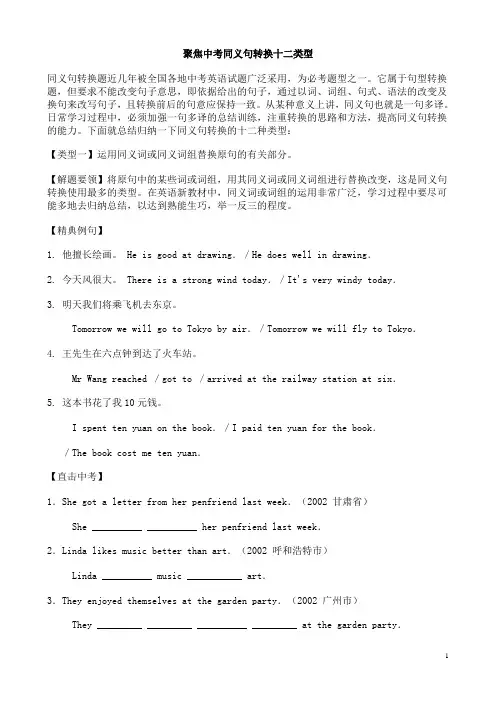
聚焦中考同义句转换十二类型同义句转换题近几年被全国各地中考英语试题广泛采用,为必考题型之一。
它属于句型转换题,但要求不能改变句子意思,即依据给出的句子,通过以词、词组、句式、语法的改变及换句来改写句子,且转换前后的句意应保持一致。
从某种意义上讲,同义句也就是一句多译。
日常学习过程中,必须加强一句多译的总结训练,注重转换的思路和方法,提高同义句转换的能力。
下面就总结归纳一下同义句转换的十二种类型:【类型一】运用同义词或同义词组替换原句的有关部分。
【解题要领】将原句中的某些词或词组,用其同义词或同义词组进行替换改变,这是同义句转换使用最多的类型。
在英语新教材中,同义词或词组的运用非常广泛,学习过程中要尽可能多地去归纳总结,以达到熟能生巧,举一反三的程度。
【精典例句】1. 他擅长绘画。
He is good at drawing./He does well in drawing.2. 今天风很大。
There is a strong wind today./It's very windy today.3. 明天我们将乘飞机去东京。
Tomorrow we will go to Tokyo by air./Tomorrow we will fly to Tokyo.4. 王先生在六点钟到达了火车站。
Mr Wang reached /got to /arrived at the railway station at six.5. 这本书花了我10元钱。
I spent ten yuan on the book./I paid ten yuan for the book./The book cost me ten yuan.【直击中考】1.She got a letter from her penfriend last week.(2002 甘肃省)She __________ __________ her penfriend last week.2.Linda likes music better than art.(2002 呼和浩特市)Linda __________ music ___________ art.3.They enjoyed themselves at the garden party.(2002 广州市)They _________ _________ __________ _________ at the garden party.4.The Smiths teach themselves Chinese after work.(2002 聊城市)The Smiths ___________ Chinese ___________ themselves after work.【类型二】运用反义词或词组改写原句有关部分。

中考英语同义句句型转换大全一同义词互相转换1 alone=by oneselfWe finished the work alone./by ourselves.2 actually=in factActually, this question is very easy./ In fact, this question is very easy.3 also=too=as wellHe’s also a member of us./He’s a member of us, too./He’s a member of us as well.4 another=one moreI’m afraid you have to wait for another ten minutes./I’m afraid you have to wait ten more minutes.5 arrive in(at)/=get to=reachWhen she arrived in/got to/reached America, she suddenly felt lonely.6 at once=right nowRun home at once=Run home right now.7 continue/go onLet’s continue/go on reading the passage.8 cost=spend=take=pay(1)I spent ten yuan of/(in) buying this book../This book cost me tenyuan./I paid ten yuan for this book.(2)It took us three days to fulfill this task./We spent three days on thistask/in fulfilling this task.9 cross=go acrossBefore crossing/going across the road, please look both sides.10 sometimes/=t timesHe is a good man, but he can be really bad-tempered sometimes./at times.11 die/=ose one’s lifeThose people died/lost their lives during the earthquake.12 now/at the momentShe is talking about the problem with her classmates now./at the moment 13 else=otherWhat else/other things can you see in the picture?14 then=t that moment/at that timeShe was shopping then/at that moment/at that time, so she knew nothing about it.15 like/love/enjoy/be fond of/be interested in/care forShe likes/enjoys/loves/is fond of/is interested in/cares for collecting stamps very much.16 will/be going to/be about toThe teachers will/are going to/are about to have a meeting tomorrow afternoon.17 want/would likeDo you want to go abroad to study further?/Would you like to go abroad to study further/18 can/be able to/have the ability to doCan you tell me the way to the library?/Are you able to tell me the way to the library?/Do you have the ability to tell me the way to the library?19 visit/call onLin Tao visited/called on his grandparents last week.20 favorite/like bestWhat’s your favorite sport?/What sport do you like best?21 happen/take placeWhat happened?/What took place?22 decide/make a decision/make up one’s mindShe can’t decide/make a decision/make up her mind where to go.23 found/establish/set upThe students founded/established/set up a group to protect the environment.24 finally/at last/in the endFinally/At last/In the end, she won the race.25 leave/be awayHe left yesterday./He has been away for a day.26 return/give backHe hasn’t returned the book to me./He hasn’t given the book back to me. return/go backHe will go back/return in a month.27 why/what for/how come-She cried so badly. –How come?What did she cry so sadly for?/Why did she cry so badly?28 over/more thanOver/More than a hundred people tried this new kind of food.29 whatever/no matter whatWhatever/No matter what you find in the box, they belong to Amy.30 whenever/no matter whenWhenever/No matter when you come to see me, I will treat you as my relative.31 walk/ go…on footDo you walk to school every day?/Do you go to school on foot every day?32 should/ought to/be supposed toWe should/ought to/are supposed to use both sides of the paper to reduce wastes.33 population/peopleWhat is the population of China?/How many people are there in China?34 quit/stop/drop/give upMy father quitted/stopped/dropped/gave up smoking.35 maybe/perhaps/may beMaybe/Perhaps it is not my pen./ The pen may not be mine.二同义词组互相转换1 a lot of/lots ofA lot of/Lots of artists will show their faces at the party.2 all over the world/around the worldEnglish is spoken widely all over the world./around the world3 not as(so)…as/less thanThis book is not as(so) interesting as that one./That book is more interesting than this one.4 as…as possible/as…as sb canRun home as fast as possible/as fast as you can to tell your mother the good news.5 at risk/in danger/in troubleThe pandas in our country are at risk./in trouble/in danger6 at the age of…/when sb.+be+…years oldHis parents died when he was six years old./His parents died at the age of six.7 because of/due to/as a result of/with one’s help/thanks toBecause of?/Due to/As a result of his help, he passed this exam.With his help/With the help of him, he passed the exam./Thanks to his help, he passed the exam.8 be careful/look out/take careLook out!/Be careful/Take care! The flood is coming.9 be worried about/worry aboutLiu Ming is worried about his following oral test./Liu Ming can’t stop his following oral test.10 both…and…/not only…but also…He is not only a singer but also a doctor./He is both a singer and a doctor.11 be good at/do well inHe is good at drawing./He does well in drawing.12 be proud of/take pride inWe are all proud of our country’s astronaut./He takes pride in ourcountry’s astronaut.13 come up with/think of/have an ideaTome came up an idea./Tom thought of an idea./Tom had an idea.14 ride a bike/go…by bikeHe often rides a bike to work./He often goes to work by bike.15 come from/be fromWhere do you come from?/Where are you from?16 have a good time/enjoy oneself//play happilyWe had a good time/enjoyed ourselves/played happily on Christmas Day.17 have a pain in head/have a headacheHe didn’t go to school today, because he had a pain in head./had a headache18 hear from/receive(get) a letter fromShe is very happy to hear from/receive a letter from a Canadian friend. 19 had better do/It’s best to doYou had better read in the sun./It’s best for you to read in the sun.20 how about/what about。
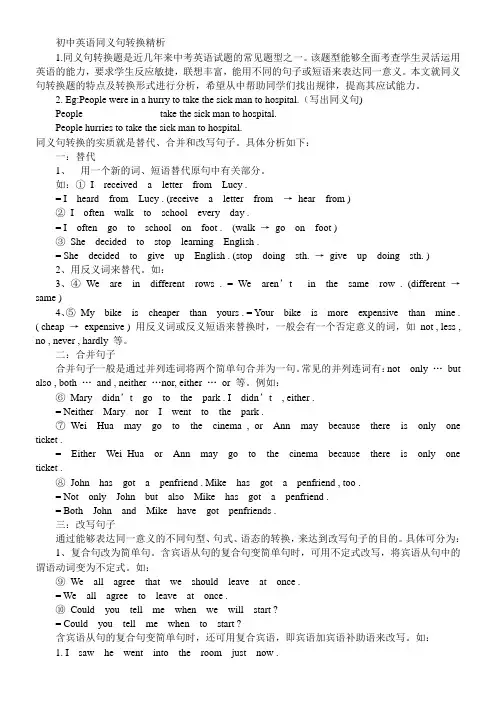
初中英语同义句转换精析1.同义句转换题是近几年来中考英语试题的常见题型之一。
该题型能够全面考查学生灵活运用英语的能力,要求学生反应敏捷,联想丰富,能用不同的句子或短语来表达同一意义。
本文就同义句转换题的特点及转换形式进行分析,希望从中帮助同学们找出规律,提高其应试能力。
2. Eg:People were in a hurry to take the sick man to hospital.(写出同义句)People _______ _______ take the sick man to hospital.People hurries to take the sick man to hospital.同义句转换的实质就是替代、合并和改写句子。
具体分析如下:一:替代1、用一个新的词、短语替代原句中有关部分。
如:①I received a letter from Lucy .= I heard from Lucy . (receive a letter from →hear from )②I often walk to school every day .= I often go to school on foot . (walk →go on foot )③She decided to stop learning English .= She decided to give up English . (stop doing sth. →give up doing sth. )2、用反义词来替代。
如:3、④We are in different rows . = We aren’t in the same row . (different →same )4、⑤My bike is cheaper than yours . = Your bike is more expensive than mine . ( cheap →expensive ) 用反义词或反义短语来替换时,一般会有一个否定意义的词,如not , less , no , never , hardly 等。
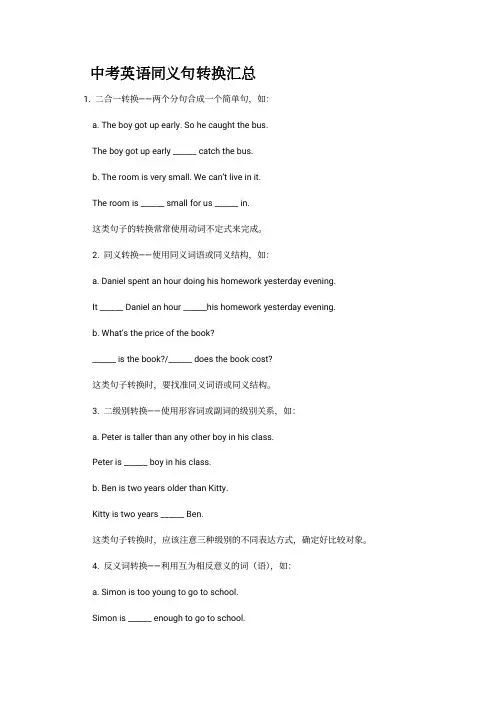
中考英语同义句转换汇总1.二合一转换——两个分句合成一个简单句,如:a.T h e b o y g o t u p e a r l y.S o h e c a u g h t t h e b u s.T h e b o y g o t u p e a r l y______c a t c h t h e b u s.b.T h e r o o m i s v e r y s m a l l.We c a n’t l i v e i n i t.T h e r o o m i s______s ma l l f o r u s______i n.这类句子的转换常常使用动词不定式来完成。
2.同义转换——使用同义词语或同义结构,如:a.D a n i e l s p e n t a n h o u r d o i n g h i s h o m e w o r k y e s t e r d a y e v e n i n g.I t______D a n i e l a n h o u r______h i s h o me w o r k y e s t e r d a y e v e n i n g.b.Wh a t’s t h e p r i c e o f t h e b o o k?______i s t h e b o o k?/______d o e s t h e b o o k c o s t?这类句子转换时,要找准同义词语或同义结构。
3.二级别转换——使用形容词或副词的级别关系,如:a.P e t e r i s t a l l e r t h a n a n y o t h e r b o y i n h i s c l a s s.P e t e r i s______b o y i n h i s c l a s s.b.B e n i s t w o y e a r s o l d e r t h a n K i t t y.K i t t y i s t w o y e a r s______B e n.这类句子转换时,应该注意三种级别的不同表达方式,确定好比较对象。
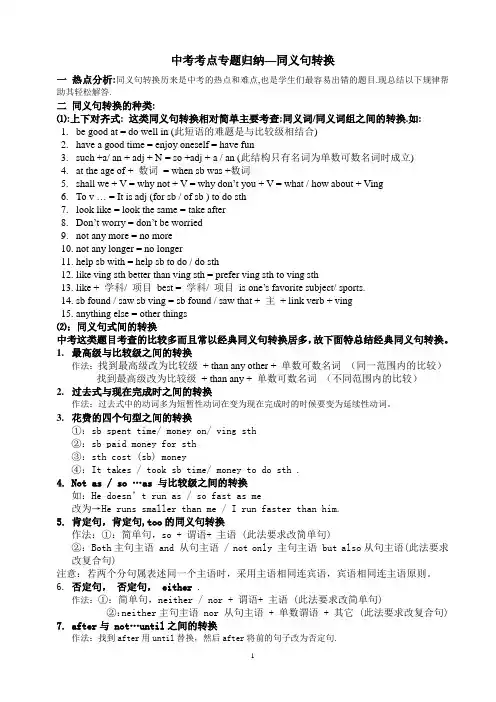
中考考点专题归纳—同义句转换一热点分析:同义句转换历来是中考的热点和难点,也是学生们最容易出错的题目.现总结以下规律帮助其轻松解答.二同义句转换的种类:⑴:上下对齐式: 这类同义句转换相对简单主要考查:同义词/同义词组之间的转换.如:1.be good at = do well in (此短语的难题是与比较级相结合)2.have a good time = enjoy oneself = have fun3.such +a/ an + adj + N = so +adj + a / an (此结构只有名词为单数可数名词时成立)4.at the age of + 数词= when sb was +数词5.shall we + V = why not + V = why don’t you + V = what / how about + Ving6.To v … = It is adj (for sb / of sb ) to do sth7.look like = look the same = take after8.Don’t worry = don’t be worried9.not any more = no more10.not any longer = no longer11.help sb with = help sb to do / do sth12.like ving sth better than ving sth = prefer ving sth to ving sth13.like + 学科/ 项目best = 学科/ 项目is one’s favorite subject/ sports.14.sb found / saw sb ving = sb found / saw that + 主+ link verb + ving15.anything else = other things⑵:同义句式间的转换中考这类题目考查的比较多而且常以经典同义句转换居多,故下面特总结经典同义句转换。
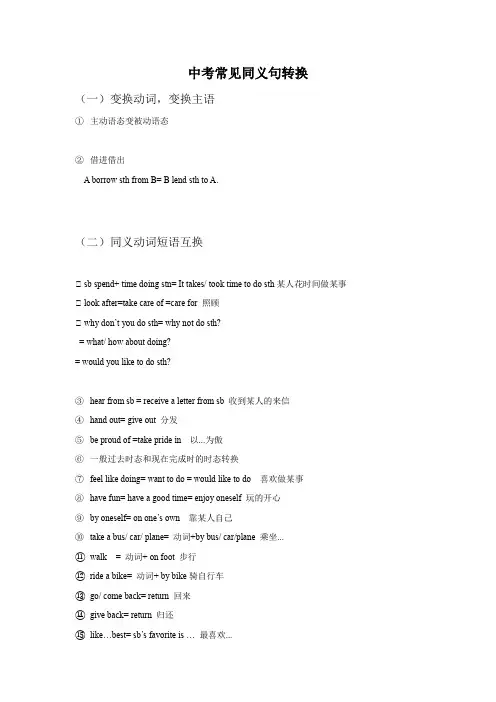
中考常见同义句转换(一)变换动词,变换主语①主动语态变被动语态②借进借出A borrow sth from B=B lend sth to A.(二)同义动词短语互换① sb spend+ time doing stn= It takes/ took time to do sth某人花时间做某事① look after=take care of =care for 照顾① why don’t you do sth= why not do sth?= what/ how about doing?= would you like to do sth?③hear from sb = receive a letter from sb 收到某人的来信④hand out= give out 分发⑤be proud of =take pride in 以...为傲⑥一般过去时态和现在完成时的时态转换⑦feel like doing= want to do = would like to do 喜欢做某事⑧have fun= have a good time= enjoy oneself 玩的开心⑨by oneself= on one’s own 靠某人自己⑩take a bus/ car/ plane= 动词+by bus/ car/plane 乘坐...⑪walk = 动词+ on foot 步行⑫ride a bike= 动词+ by bike骑自行车⑬go/ come back= return 回来⑭give back= return 归还⑮like…best= sb’s favorite is … 最喜欢...⑯talk with= have a talk with与某人交谈⑰walk= have a walk 散步,走路⑱happen = take place 发生(三)句式转换① would you mind doing= would you mind if/whether +句子① 祈使句+ and/ or +句子(一般将来时)= if +句子,主句① 宾语从句中,特殊疑问词+陈述语序的句子=特殊疑问词+to do① 两个简单句合为一句(四)同义句转换练习1. The Yangtze River is the longest river in Asia. (同义句转换)The Yangtze River is longer than ________ ________ river in Asia.2. Would you mind him smoking here?(改为同义句)Would you mind _______ he ________ here?3. We take pride in our country because it has made great progress in many fields.(改为同义句)We are ______ _______ our country because it has made great progress in many fields.4. Why don't you clean up your room at once?(改为同义句)_________ ________ clean up your room at once?5. Kate takes a bus to school every day. ( 改为同义句)Kate goes to school________ ________ every day.6. I lent the book to Gina a few days ago.(改为同义句)Gina ____ the book ____ me a few days ago.7. You’d better go to different clubs. Don’t stay in the classroom. (改为同义句)You’d better go to different clubs _____ _____ staying in the classroom.8. My sister will take care of my cat when I am on holiday. (改为同义句)My sister will ________my cat when I am on holiday.9. It will take them about five years to build the high-speed railway. (改为同义句) They will _________ about five years in __________ the high-speed railway.10. My classmates walked to Three Gorges Museum yesterday. (改为同义句)My classmates went to Three Gorges Museum ________ ________ yesterday.11. Wang Bing was very glad to receive a letter from his old classmates.(改为同义句)Wang Bing was very glad to __________ __________ his old classmates.。
(完整版)同义句转换类型大全初中英语第三章句型转换表述同一意思,可以用多种不同的表达方式。
这在英语学习中体现为运用不同句型来表述同一意思。
细微而言,表述同一意思的各个不同句型各有其语义上的倾重点;但一般情况下,尤其是对初学者而言,这种细微的“异”并不要求强调。
换言之,是要求从“同”的角度来看待表述同一意思的不同句型。
本章拟以列举实例的方式来作一综合介绍。
一、一句多讲1.今天天气怎么样?How is the weather today?What is the weather like today?2.你怎么啦?What is the matter with you?What’s your trouble?What’s wrong with you?3.是上学的时候了。
It’s time for school.It’s time to go to school.4.这男孩今天16岁了。
The boy is sixteen (years old).The boy is at the age of sixteen.He is a boy of sixteen.5.我把门打开你不介意吧?Do you mind if I open the door?Do you mind my opening the door?6.他每天花1小时做作业。
It takes him an hour to do his homework every day.He spends an hour (in) doing his homework every day.He spends an hour on his homework every day.7.自从1992年以来上海发生了巨大的变化。
Great changes have taken place in Shanghai since 1992. There have been great changes in Shanghai since 1992. Shanghai has changed a lot since 1992.8.她的父亲去世5年了。
中考常见同义句转换(一)变换动词,变换主语①主动语态变被动语态②借进借出A borrow sth from B=B lend sth to A.(二)同义动词短语互换① sb spend+ time doing stn= It takes/ took time to do sth某人花时间做某事① look after=take care of =care for 照顾① why don’t you do sth= why not do sth?= what/ how about doing?= would you like to do sth?③hear from sb = receive a letter from sb 收到某人的来信④hand out= give out 分发⑤be proud of =take pride in 以...为傲⑥一般过去时态和现在完成时的时态转换⑦feel like doing= want to do = would like to do 喜欢做某事⑧have fun= have a good time= enjoy oneself 玩的开心⑨by oneself= on one’s own 靠某人自己⑩take a bus/ car/ plane= 动词+by bus/ car/plane 乘坐...⑪walk = 动词+ on foot 步行⑫ride a bike= 动词+ by bike骑自行车⑬go/ come back= return 回来⑭give back= return 归还⑮like…best= sb’s favorite is … 最喜欢...⑯talk with= have a talk with与某人交谈⑰walk= have a walk 散步,走路⑱happen = take place 发生(三)句式转换① would you mind doing= would you mind if/whether +句子① 祈使句+ and/ or +句子(一般将来时)= if +句子,主句① 宾语从句中,特殊疑问词+陈述语序的句子=特殊疑问词+to do① 两个简单句合为一句(四)同义句转换练习1. The Yangtze River is the longest river in Asia. (同义句转换)The Yangtze River is longer than ________ ________ river in Asia.2. Would you mind him smoking here?(改为同义句)Would you mind _______ he ________ here?3. We take pride in our country because it has made great progress in many fields.(改为同义句)We are ______ _______ our country because it has made great progress in many fields.4. Why don't you clean up your room at once?(改为同义句)_________ ________ clean up your room at once?5. Kate takes a bus to school every day. ( 改为同义句)Kate goes to school________ ________ every day.6. I lent the book to Gina a few days ago.(改为同义句)Gina ____ the book ____ me a few days ago.7. You’d better go to different clubs. Don’t stay in the classroom. (改为同义句)You’d better go to different clubs _____ _____ staying in the classroom.8. My sister will take care of my cat when I am on holiday. (改为同义句)My sister will ________my cat when I am on holiday.9. It will take them about five years to build the high-speed railway. (改为同义句) They will _________ about five years in __________ the high-speed railway.10. My classmates walked to Three Gorges Museum yesterday. (改为同义句)My classmates went to Three Gorges Museum ________ ________ yesterday.11. Wang Bing was very glad to receive a letter from his old classmates.(改为同义句)Wang Bing was very glad to __________ __________ his old classmates.。
中考英语同义句转换方法归类及相关练习总所周知,语言是思想、情感交流的载体。
相同的意思有时可以用不同的方式表达。
了解并学会多种表达法,能更好地适应交际的需要。
同义句转换也是中考常考题型。
此类题型考生失分较大。
现归纳以下解题方法与思路。
一、运用同义词或同义词组e.g.1. I got a letter from my brother last weekend.= I heard from my brother last weekend.2.His little sister could dress herself when she was three years old.= His little sister was able to dress herself at the age of three.这类题目首先要注意比较上下两句,找出需要改动的地方,运用同义词或同义词组进行转换。
还要注意把握两句的时态、数的单复和主谓一致等。
Exercises:1.A.The children are having a good time in the park now.B. The children are__________ ____________ in the park __________________ ___________.2.A.He spent thirty minutes in finishing his homework. My God.B._____ _________ him ________ _________ _________ ________ finish his homework.3.A.Very soon the baby started crying.B. In ________ ___________ the baby _________ ________ cry.4.A.What do you think of the movie you saw last week?B.___________ do you __________ the movie you saw last week?5.A.There is only an old chair in the room.B. There’s_________ __________ an old chair in the room.6.A.What’s the matter with you, young man?B. What’s _________ with you, young man?7.A.Did you have any problems in working out the math problem?B. Did you have ______________ in _____________ the math problem?8.A.He’ll come to my birthday soon after he finishes his project.B. He’ll come to my birthday __________ __________ ________ his project is finished.二、运用反义词或反义词组e.g.1.She failed the English exam last time.= She didn’t pass the English exam last time.2.His house is near the school.= His house isn’t far from the school.= His house is close to the school.这类题目可以否定句中的动词或形容词,是两句意思相符。
同义句改写十法同义句转换题是近几年中考英语的一个常考题型,其出题形式通常是同时给出两个句子,第一句完整,第二句中设有几处空格,要求考生填入适当的词或词组,使第二句的意思与第一句意思相同。
它综合考查考生的语法、词汇、短语或习惯用语和句型结构等知识,要求运用所学的词汇、语法知识和句型结构填写句子,使句子结构完整、逻辑合理、语法知识无误、意思与所给句子相同。
通过对近几年的中考英语试题中同义句转换题的分析,我们发现中考英语同义句转换题主要考查以下几个方面:一、根据句意改写主要考查对句意的理解和用一个词或一种结构来概括上句的意思的综合能力。
如:1.The runner fell behind the others though he did what he could.The runner ____to keep up with the others though he ____his ______.分析:根据第一句“虽然这名赛跑选手尽了全力,但还是落在了别人的后面”就知道“fell behind the other s—落在别人后面”意思是“没有赶上别人—failed to keep up with the others.”,“尽力—try one’s best”,所以应填failed, tried, to.2.Before talking, he told me his name and I told him my name.We _____ _____ ______ ______ before talking.分析:根据第一句“他把他的名字告诉了我,我把我的名字告诉他。
”就知道“相互告知了对方的名字。
”所以应填:told each other’s names。
2.利用从句改写即运用关系代词、关系副词或从属连词改写。
如:1.The man is talking with a lady. He gave us a talk last week.The man ______ gave us a talk last week ______ _____ with a lady.分析:2.He didn’t want to miss the first bus, so he got up early.He got up early _________ _________ he could catch the first bus.3.利用某些典型句式或结构进行转换这类典型结构如so…that…,too…to…,enough to,not…until…,so do I等。
中考英语同义句九种类型中考英语同义句九种类型同义句转换题是近几年中考英语的一个常考题型,其出题形式通常是同时给出两个句子,第一句完整,第二句中设有几处空格,要求考生填入适当的词或词组,使第二句的意思与第一句意思相同。
它综合考查考生的语法、词汇、短语或习惯用语和句型结构等知识,要求运用所学的词汇、语法知识和句型结构填写句子,使句子结构完整、逻辑合理、语法知识无误、意思与所给句子相同。
通过对近几年的中考英语试题中同义句转换题的分析,我们发现中考英语同义句转换题主要考查以下几个方面:一、运用同义词(组)进行转换用同义词或同义词组对原句中的某些词或词组进行替换,注意转换后的词或词组的词形变化要与句子其他成分相适应。
如:1. That day we could see flowers everywhere.That day we could see flowers ____ and ___ .2. The teacher always takes good care of the children in the school.The teacher always _____ ____ the children well in the school.3. Some of us are good at telling stories.Some of us _____ _____ in telling stories.二、运用反义词(组)的否定式进行转换即用反义词或词组的否定式表达与原句相同的意思,主要考查学生对反义词、词组的积累和换位思维的能力。
如:1. It’s clear that this visit is different from last time.It’s clear that this visit is not the ____ ___ last time.2. I think wealth is less important than health.I __ think wealth is ___ important than health.3. He lent some money to his friend.His friend ______ some money _____ him.三、运用不同语态进行转换即运用主动语态与被动语态的变化来转换同义词,但此时要特别注意时态、情态动词一致性。
中考英语重点语法词法考点16:句型转换之同义句转换同义句转换是句型转换题型中一种非常重要的形式。
所谓同义句转换,是指用不同的词汇、短语及句型表示相同或相近的意思。
它是中考命题的一大热点。
现将常见的同义句转换形式作一归纳:一、用同义词(组)或近义词(组)改写。
做此题型时,我们可以采用“词语替代法”,此法是指用词性相同的同义词、近义词或同义词组对原句的某些成分进行简单的替代,而句子结构保持不变。
因此,我们在学习过程中要掌握尽可能多的同义词(组),如:be able to/can;arrive in(at)/reach/get to;be good at/do well in;have a good time/enjoy oneself;look after/take care of;over/more than;difficult/hard;receive(get)a letter from/hear from等等。
具体运用时,还要注意它们在句中的位置,形式与转换后句中其他部分的相应变化。
例如:1. The children are wearing beautiful clothes.The children are _________beautiful clothes.2. Every day, Yao Ming receives E-mails from thousands of basketball fans.Every day, Yao Ming _________ _________thousands of basketball fans.3. Mr. Smith is working.Mr. Smith is__________ __________.4. They will get to London in four days.They will _______ _______ London in four days.二、用反义词(组)改写。
聚焦中考同义句转换十二类型同义句转换题近几年被全国各地中考英语试题广泛采用,为必考题型之一。
它属于句型转换题,但要求不能改变句子意思,即依据给出的句子,通过以词、词组、句式、语法的改变及换句来改写句子,且转换前后的句意应保持一致。
从某种意义上讲,同义句也就是一句多译。
日常学习过程中,必须加强一句多译的总结训练,注重转换的思路和方法,提高同义句转换的能力。
下面就总结归纳一下同义句转换的十二种类型:【类型一】运用同义词或同义词组替换原句的有关部分。
【解题要领】将原句中的某些词或词组,用其同义词或同义词组进行替换改变,这是同义句转换使用最多的类型。
在英语新教材中,同义词或词组的运用非常广泛,学习过程中要尽可能多地去归纳总结,以达到熟能生巧,举一反三的程度。
【精典例句】1. 他擅长绘画。
He is good at drawing./He does well in drawing.2. 今天风很大。
There is a strong wind today./It's very windy today.3. 明天我们将乘飞机去东京。
Tomorrow we will go to Tokyo by air./Tomorrow we will fly to Tokyo.4. 王先生在六点钟到达了火车站。
Mr Wang reached /got to /arrived at the railway station at six.5. 这本书花了我10元钱。
I spent ten yuan on the book./I paid ten yuan for the book./The book cost me ten yuan.【直击中考】1.She got a letter from her penfriend last week.(2002 甘肃省)She __________ __________ her penfriend last week.2.Linda likes music better than art.(2002 呼和浩特市)Linda __________ music ___________ art.3.They enjoyed themselves at the garden party.(2002 广州市)They _________ _________ __________ _________ at the garden party.4.The Smiths teach themselves Chinese after work.(2002 聊城市)The Smiths ___________ Chinese ___________ themselves after work.【类型二】运用反义词或词组改写原句有关部分。
【解题要领】此类转换主要是通过改换主语和运用其相关词或词组的反义,进行同义转换。
【精典例句】1. 我向他借了一台电脑。
I borrowed a computer from him./He lent a computer to me.2. 我认为数学比英语难。
I think maths is harder than English. I think English is easier than maths.【直击中考】5.Chinese is more popular than Japanese.(2001 宁夏)Japanese is _________ popular than Chinese.6.The runner fell behind the others though he did what he could.(2001 济南市)The runner ________ to ________ with the others though he ________ his ________.【类型三】运用相同涵义的不同句式来表达。
【解题要领】不同的句式表达同一涵义是英语表达的显著特点。
在英语新教材中,这样的句式应用得也比较广泛。
如:Can I help you?/May I help you?/ What can I do for you?(我能帮你吗?)应要求学生充分掌握。
【精典例句】1. 这位画家画一匹马花费了两个钟头。
The artist spent two hours drawing a horse./It took the artist two hours to draw a horse.2. 让我们去动物园好吗?Shall we go to the zoo?/Let's go to the zoo,shall we?3. 今天天气怎么样?What's the weather like today?/How's the weather today?【直击中考】7.Don't open the door, will you?(2002 盐城市)Will you please ___________ the door __________?8.How many people live in France?(2002 厦门市)_________ _________ the population of France?9.We spent twenty minutes cleaning the room yesterday.(2002 哈尔滨市)It _________ _________ twenty minutes _________ ________ the room yesterday.聚焦中考同义句转换“十二类型”(二)【类型四】运用感叹句的两种句式进行转换。
【解题要领】感叹句的两种句式可进行相互转换,但必须把握其句型。
1)How + adj./adv.+ 主语 + 谓语!2)What + a(an)+ adj.+ 单数名词 + 主语 + 谓语!What + adj.+ 复数名词/不可数名词 + 主语 + 谓语!【精典例句】1.这个男孩多么善良啊!How kind the boy is!/What a kind boy he is!2.这首乐曲多么优美啊!How beautiful the music is!/What beautiful music it is!【直击中考】10.How beautiful the park is!(2000 广州市)__________ __________ _____________ park it is!【类型五】运用两种时态进行改写。
【解题要领】这两种时态是针对一般过去时与现在完成时而言的。
一般过去时应表述发生在过去某一时间的动作,惟此,才可能转为现在完成时,并后跟一段时间,但应特别注意动词是否属于延续性动词,如果为非延续性动词,则需将其改为延续性动词或延续性状态。
这样的动词主要有:begin/start—be on; come—be here;leave—be away(from); buy—have;borrow—keep;die—be dead;return—be back;marry—be married;fall asleep/go to sleep—be asleep;open—be open(adj.);close—be closed(adj.);catch a cold—have a cold;fallill—be ill;join the League/Party—be in the League /Party(be aLeague/Party member;join the army—be in the army/be a soldier;arrive in /at—be in/at;get up—be up,等等。
【精典例句】1.他上周买了一辆新自行车。
He bought a new bike last week.He has had a new bike since last week.2.王涛六年前参军。
Wang Tao joined the army six years ago.Wang Tao has been a soldier for six years.Wang Tao has been in the army for six years.【直击中考】11.The film began 20 minutes ago.(2002盐城市)The film has been ___________ ___________ 20 minutes.12.Sam's grandfather died 10 years ago.(2002上海市)Sam's grandfather has been ___________ ___________ 10 years.13.My grandpa joined the Party thirty years ago.(2002福州市)My grandpa _________ _________ __________the Party for thirty years.14.I got up half an hour ago.(2002哈尔滨市)I __________ _________ up for half an hour.【类型六】运用复合句和不定式进行相互改写。
【解题要领】此类复合句主要是宾语从句和结果状语从句,宾语从句改为不定式的句式有:1)hope/wish,be sure,tell 等后跟 that 引导的从句,可转换为不定式;2)特殊疑问词引导的宾语从句,也可转换为“特殊疑问词 + to do”结构,构成不定式短语。
so … that …引导的结果状语从句有两种情况:1)表示肯定的结果,可与“enough to”结构互换;2)表示否定的结果,它既可以与“too … to”结构互换,也可以改为“not + adj./adv.+ enough to”。
(注:此时的形容词或副词应为上句的反义词。
)注意:“so … that …”结构前后主语不一致时,应在 enough 或 too + adj.后面加 for sb.。
【精典例句】1.我希望将来某一天参观月球。
I hope that I will visit the moon some day.I hope to visit the moon some day.2.他向我显示如何使用电脑。